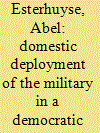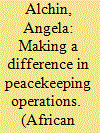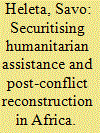|
|
|
Sort Order |
|
|
|
Items / Page
|
|
|
|
|
|
|
| Srl | Item |
| 1 |
ID:
168433


|
|
|
|
|
| Summary/Abstract |
The paper aims at providing a brief analysis on key realities underpinning the debate on the domestic deployment of the South African armed forces. The theoretical analysis highlights the divergent reality of shrinking budgets and capabilities, and a growing operational schedule confronting militaries in the contemporary era. This is exacerbated by a threat agenda that necessitates armed forces to downscale and police forces to upscale in order to address a threat reality that is neither predominantly external nor exclusively internal in nature. The South African military is fortunate to have access to a long history of domestic deployment that suggests key guidelines for future thinking about internal deployments. The revival of internal military deployment will confront the South African Defence Force (SANDF) with critical trade-offs in decisions about distribution of its resources, sustaining current internal and external deployments, command and control structures, facilities, and key personnel and equipment deficiencies. Routine participation in internal operations, in effect, implies a re-invention of defence policy and SANDF strategies for force development, force deployment, and force employment.
|
|
|
|
|
|
|
|
|
|
|
|
|
|
|
|
| 2 |
ID:
160216


|
|
|
|
|
| Summary/Abstract |
Recruiting more women into peacekeeping operations due to the perceived unique contributions they are said to make to missions has been widely advocated by the United Nations (UN) and other agencies as a means to overcome the unintended consequents of deployments – mainly the ongoing reports of sexual abuse of locals by male soldiers. However, taking into account the broader gender debates surrounding women’s contributions to peacekeeping, and by considering the experiences of women in the South African National Defence Force (SANDF), this study reveals the challenges women face in realising these widely advocated contributions. These challenges include the current recruiting processes, the self-perception of female soldiers, the deeply patriarchal ideologies within South African society, and the hyper-masculine culture which overwhelms the military. The study concludes that, for women to be properly utilised, a reassessment of recruitment processes in the SANDF is necessary, gender training should be prioritised, and an androgynous soldier identity should be advocated.
|
|
|
|
|
|
|
|
|
|
|
|
|
|
|
|
| 3 |
ID:
113325


|
|
|
|
|
| Publication |
2012.
|
| Summary/Abstract |
South Africa's military has, since the First World War, been an oft-used and effective tool in the conduct of South African foreign policy, but this role has not always translated into power for Defence Department principals in its formulation. South African Defence Ministers for most of the country's history have played a minor role in the making of foreign policy; despite a change in this dynamic between approximately 1975-1990, the post-apartheid era has once again seen a diminishment of Defence's power in this arena. This article examines why Defence Ministers have generally been such weak players, with an eye toward disaggregating whether this was a product of interpersonal relationships with Cabinet and - most importantly - the Head of State, or whether this influence (or lack thereof) was more a function of South Africa's international standing. While determining who has influence on this process is difficult given the primacy of the national leader in making foreign policy and a lack of insider accounts by participants in the process, this article relies upon several interviews with participants and knowledgeable observers that help illuminate the process and Defence's role in it.
|
|
|
|
|
|
|
|
|
|
|
|
|
|
|
|
| 4 |
ID:
144704


|
|
|
|
|
| Summary/Abstract |
The South African Defence Review 2014 is the country's new defence policy. The Review, which is expected to steer South African defence policymaking for the next few decades, discusses in detail the role of the South African National Defence Force (SANDF) in peace missions in Africa and proposes the direct involvement of the country's soldiers in both military and civilian tasks, from peacekeeping to humanitarian assistance, post-conflict reconstruction and development. This paper contains a critical review of the Review with regard to South Africa's envisaged contribution to regional and continental peace and stability. It is argued that humanitarian assistance and post-conflict reconstruction should not be securitised and that the SANDF should only be tasked with peacekeeping and the establishment of stability and security in fragile in-conflict and post-conflict settings. The humanitarian work should be left to humanitarian and aid agencies, while reconstruction and development should be left to organisations such as the New Partnership for Africa's Development, continental and international development organisations, and local actors.
|
|
|
|
|
|
|
|
|
|
|
|
|
|
|
|
|
|
|
|
|